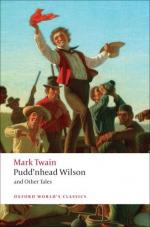By the end of a week things had quieted down again; the wild intoxication of pride and joy had sobered to a soft, sweet, silent delight—a sort of deep, nameless, unutterable content. All faces bore a look of peaceful, holy happiness.
Then a change came. It was a gradual change; so gradual that its beginnings were hardly noticed; maybe were not noticed at all, except by Jack Halliday, who always noticed everything; and always made fun of it, too, no matter what it was. He began to throw out chaffing remarks about people not looking quite so happy as they did a day or two ago; and next he claimed that the new aspect was deepening to positive sadness; next, that it was taking on a sick look; and finally he said that everybody was become so moody, thoughtful, and absent-minded that he could rob the meanest man in town of a cent out of the bottom of his breeches pocket and not disturb his reverie.
At this stage—or at about this stage—a saying like this was dropped at bedtime—with a sigh, usually—by the head of each of the nineteen principal households:
“Ah, what could have been the remark that Goodson made?”
And straightway—with a shudder—came this, from the man’s wife:
“Oh, don’t! What horrible thing are you mulling in your mind? Put it away from you, for God’s sake!”
But that question was wrung from those men again the next night—and got the same retort. But weaker.
And the third night the men uttered the question yet again—with anguish, and absently. This time—and the following night—the wives fidgeted feebly, and tried to say something. But didn’t.
And the night after that they found their tongues and responded—longingly:
“Oh, if we could only guess!”
Halliday’s comments grew daily more and more sparklingly disagreeable and disparaging. He went diligently about, laughing at the town, individually and in mass. But his laugh was the only one left in the village: it fell upon a hollow and mournful vacancy and emptiness. Not even a smile was findable anywhere. Halliday carried a cigar-box around on a tripod, playing that it was a camera, and halted all passers and aimed the thing and said “Ready!—now look pleasant, please,” but not even this capital joke could surprise the dreary faces into any softening.




